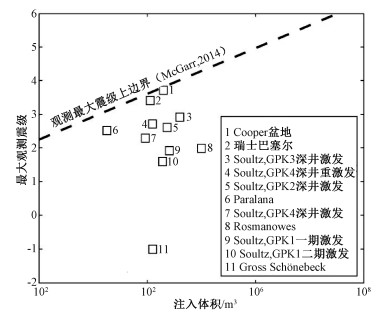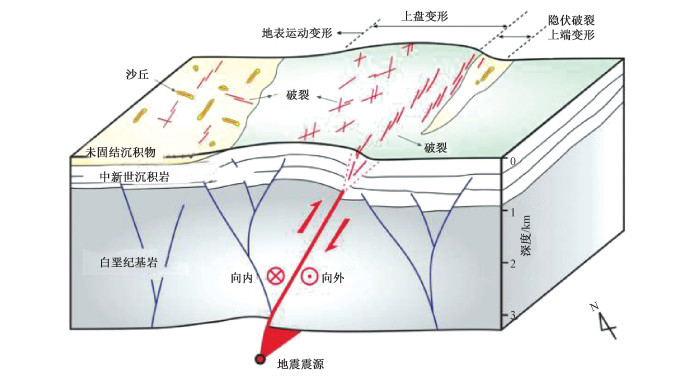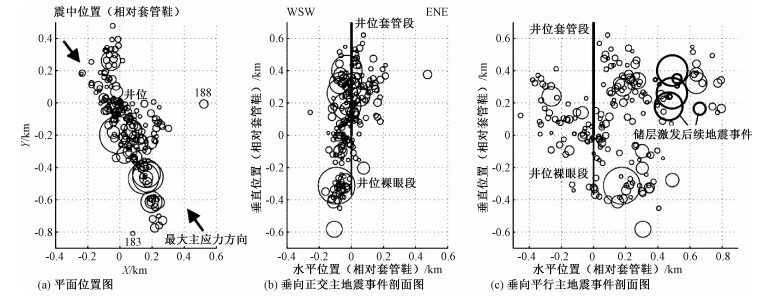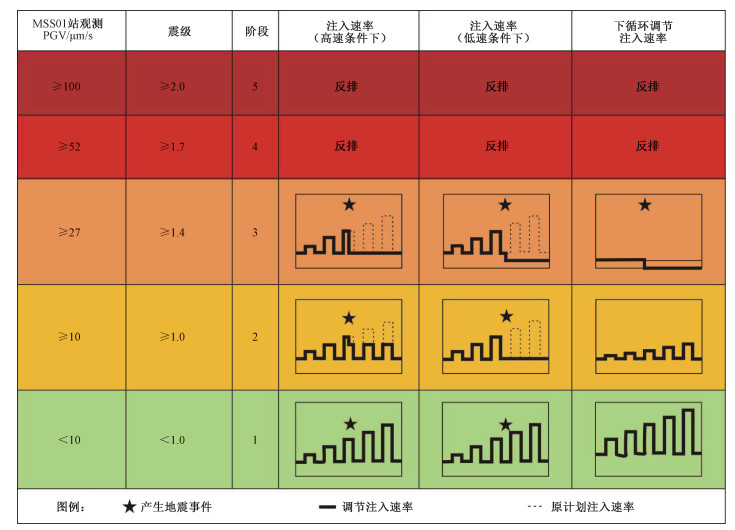Research on the status quo of environmental geology impact of enhanced geothermal system and countermeasures
-
摘要:
增强型地热系统(EGS)是目前地热资源开发利用的前沿热点,其发电几乎不受外界环境影响,且几乎不对人类环境产生污染和破坏,因而备受关注。近年来学者们发现EGS开发过程中,热储改造注水运行可导致大量的微震事件出现,少数EGS工程的注水过程与当地3级以上地震明显相关,需要密切关注。文章对增强型地热系统的原理、技术以及开发利用现状进行介绍,并对国内外主要的EGS相关环境影响事件进行了整理分析,在此基础上,总结了目前的EGS环境影响研究进展,提出了下一步可以采取的措施,可以为国内EGS工程选址及开发提供有效借鉴。
Abstract:Enhanced geothermal system (EGS) is the hotspot of geothermal resource development and utilization. Its power generation is almost impervious to the external environment and it cause little pollution and damage to the environment. In recent years, it has been found that in the process of EGS development, the geothermal reservoir reconstruction and water injection operation can lead to a large number of microseismic events. The water injection processes of a few EGS projects are obviously related to the local earthquakes of magnitude 3 or above, causing close attention of researchers. This paper introduces the principle, technology and development and utilization status of the enhanced geothermal system. And the main EGS related environmental impact events at home and abroad are sorted out and analyzed. On this basis, the current research progress of EGS environmental impact is summarized, and the coutermeasures in the next step are put forward, which provide effective reference for the site selection and development of EGS projects in China.
-
Key words:
- enhanced geothermal system /
- induced seismicity /
- risk mitigation /
- Pohang /
- Basel
-

-
图 1 增强型地热系统示意图(Tester et al., 2006)
Figure 1.
图 2 地热工程流体注入体积与观测最大震级微震关系图(据Zang et al., 2014修改)
Figure 2.
图 3 韩国Pohang地震断裂机制推测模型图(据Choi et al., 2019修改)
Figure 3.
图 4 瑞士Basel深层地热项目震中位置分布图(据Deichmann and Giardini, 2009修改)
Figure 4.
图 5 交通指示灯系统用于PX-1井示意图(据Hofmann et al., 2019修改)
Figure 5.
-
ASANUMA H, KENMOKU Y, NIITSUMA H, et al., 2009. Interpretation of reservoir creation process at Cooper Basin by microseismic multiplet analysis[J]. GRC Transactions, 33:149-153. http://www.wanfangdata.com.cn/details/detail.do?_type=perio&id=CC029673275
BACHMANN C E, WIEMER S, WOESSNER J, et al., 2011. Statistical analysis of the induced Basel 2006 earthquake sequence:introducing a probability-based monitoring approach for Enhanced Geothermal Systems[J]. Geophysical Journal International, 186(2):793-807. doi: 10.1111/j.1365-246X.2011.05068.x
BAISCH S, WEIDLER R, VÖRÖS R, et al., 2006. Induced seismicity during the stimulation of a geothermal HFR reservoir in the Cooper Basin, Australia[J]. Bulletin of the Seismological Society of America, 96(6):2242-2256. doi: 10.1785/0120050255
BAO X H, WU Y D, WEI M C, et al., 2014. Impact of water/CO2-rock interactions on formation physical properties in EGS[J]. Science & Technology Review, 32(14):42-47. (in Chinese with English abstract) http://en.cnki.com.cn/Article_en/CJFDTOTAL-KJDB201414017.htm
BARIA R, BAUMGÄRTNER J, RUMMEL F, et al., 1999. HDR/HWR reservoirs:concepts, understanding and creation[J]. Geothermics, 28(4-5):533-552. doi: 10.1016/S0375-6505(99)00045-0
BENATO S, HICKMAN S, DAVATZES N C, et al., 2016. Conceptual model and numerical analysis of the Desert Peak EGS project:Reservoir response to the shallow medium flow-rate hydraulic stimulation phase[J]. Geothermics, 63:139-156. doi: 10.1016/j.geothermics.2015.06.008
BETHMANN F, DEICHMANN N, MAI P M, 2012. Seismic wave attenuation from borehole and surface records in the top 2.5 km beneath the city of Basel, Switzerland[J]. Geophysical Journal International, 190(2): 1257-1270.
BRAUN R, 2007. Analyse gebirgsmechanischer Versagenszustände beim Geothermieprojekt Basel[R]. Report to Geopower Basel AG for Swiss Deep Heat Mining Project Basel. Dr. Roland Braun. Basel, Switzerland: Consultancy in Rock Mechanics, 30.
BROWN D W, 2000. A hot dry rock geothermal energy concept utilizing supercritical CO2 instead of water[C]//Proceedings of the twenty-fifth workshop on geothermal reservoir engineering. Stanford: Stanford University, 233-238.
BROWN D W, 2009. Hot dry rock geothermal energy: important lessons from Fenton hill[C]//Proceedings of the thirty-fourth workshop on geothermal reservoir engineering. Stanford: Stanford University.
CHOI J H, KO K, GIHM Y S, et al., 2019. Surface deformations and rupture processes associated with the 2017 Mw 5.4 Pohang, Korea, Earthquake[J]. Bulletin of the Seismological Society of America, 109(2):756-769. doi: 10.1785/0120180167
CLADOUHOS T T, PETTY S, SWYER M W, et al., 2016. Results from Newberry Volcano EGS Demonstration, 2010-2014[J]. Geothermics, 63:44-61 doi: 10.1016/j.geothermics.2015.08.009
DEICHMANN N, GIARDINI D, 2009. Earthquakes induced by the stimulation of an enhanced geothermal system below Basel (Switzerland)[J]. Seismological Research Letters, 80(5):784-798. doi: 10.1785/gssrl.80.5.784
EDWARDS B, KRAFT T, CAUZZI C, et al., 2015. Seismic monitoring and analysis of deep geothermal projects in St Gallen and Basel, Switzerland[J]. Geophysical Journal International, 2015, 201(2):1022-1039. doi: 10.1093/gji/ggv059
ELLSWORTH W L, GIARDINI D, TOWNEND J, et al., 2019. Triggering of the Pohang, Korea, earthquake (MW 5.5) by enhanced geothermal system stimulation[J]. Seismological Research Letters, 90(5):1844-1858. https://www.researchgate.net/publication/335044845_Triggering_of_the_Pohang_Korea_Earthquake_Mw_55_by_Enhanced_Geothermal_System_Stimulation
GAN H N, WANG G L, LIN W J, et al., 2015. Research on the occurrence types and genetic models of hot dry rock resources in China[J]. Science & Technology Review, 33(19):22-27. (in Chinese with English abstract) http://www.wanfangdata.com.cn/details/detail.do?_type=perio&id=kjdb201519006
GÉRARD A, GENTER A, KOHL T, et al., 2006. The deep EGS (Enhanced Geothermal System) project at Soultz-sous-Forêts (Alsace, France)[J]. Geothermics, 35(5-6):473-483. doi: 10.1016/j.geothermics.2006.12.001
GENTER A, EVANS K, CUENOT N, et al., 2010. Contribution of the exploration of deep crystalline fractured reservoir of soultz to the knowledge of enhanced geothermal systems (EGS)[J]. Comptes Rendus Geoscience, 342(7-8):502-516. doi: 10.1016/j.crte.2010.01.006
GRIGOLI F, CESCA S, RINALDI A P, et al., 2018. The November 2017 Mw 5.5 Pohang earthquake:A possible case of induced seismicity in South Korea[J]. Science, 360(6392):1003-1006. doi: 10.1126/science.aat2010
HÄRING M O, SCHANZ U, LADNER F, et al., 2008. Characterisation of the Basel 1 enhanced geothermal system[J]. Geothermics, 37(5):469-495. doi: 10.1016/j.geothermics.2008.06.002
HENDERSON J R, BARTON D J, FOULGER G R, 1999. Fractal clustering of induced seismicity in The Geysers geothermal area, California[J]. Geophysical Journal International, 139(2):317-324. doi: 10.1046/j.1365-246x.1999.00939.x
HOFMANN H, ZIMMERMANN G, FARKAS M, et al., 2019. First field application of cyclic soft stimulation at the Pohang Enhanced Geothermal System site in Korea[J]. Geophysical Journal International, 217(2):926-949. doi: 10.1093/gji/ggz058
HORI Y, KITANO K, KAIEDA H, et al., 1999. Present status of the Ogachi HDR Project, Japan, and future plans[J]. Geothermics, 28(4-5):637-645. http://www.wanfangdata.com.cn/details/detail.do?_type=perio&id=431bee3f9fd61fd8354237e93dffd415
KIM K H, REE J H, KIM Y, et al., 2017. Assessing whether the 2017 Mw 5.4 Pohang earthquake in South Korea was an induced event[J]. Science, 360(6392):1007-1009.
KIM K I, MIN K B, KIM K Y, et al., 2018. Protocol for induced microseismicity in the first enhanced geothermal systems project in Pohang, Korea[J]. Renewable and Sustainable Energy Reviews, 91:1182-1191. doi: 10.1016/j.rser.2018.04.062
KOLDITZ O, CLAUSER C, 1998. Numerical simulation of flow and heat transfer in fractured crystalline rocks:Application to the Hot Dry Rock site in Rosemanowes (U.K.)[J]. Geothermics, 27(1):1-23. doi: 10.1016/S0375-6505(97)00021-7
LEE Y, PARK S, KIM J, et al., 2010. Geothermal resource assessment in Korea[J]. Renewable and Sustainable Energy Reviews, 14(8):2392-2400. doi: 10.1016/j.rser.2010.05.003
LEE T J, SONG Y, PARK D W, et al., 2015. Three dimensional geological model of Pohang EGS pilot site, Korea[C]//Proceedings of the world geothermal congress. Melbourne, Australia. 19 to 25 April.
LU C, WANG G L, 2015. Current status and prospect of hot dry rock research[J]. Science & Technology Review, 33(19):13-21. (in Chinese with English abstract) http://www.wanfangdata.com.cn/details/detail.do?_type=perio&id=kjdb201519005
LU S M, 2018. A global review of enhanced geothermal system (EGS)[J]. Renewable and Sustainable Energy Reviews, 81:2902-2921. doi: 10.1016/j.rser.2017.06.097
LUO J, ZHU Y Q, GUO Q H, et al., 2018. Chemical stimulation on the hydraulic properties of artificially fractured granite for enhanced geothermal system[J]. Energy, 142:754-764. doi: 10.1016/j.energy.2017.10.086
MAURER V, CUENOT N, GAUCHER E, et al., 2015. Seismic monitoring of the Rittershoffen EGS Project (Alsace, France)[C]//Proceedings world geothermal congress 2015. Melbourne, Australia. 19 to 25 April.
NAGANO K, MORIYA H, ASANUMA H, et al., 1994. Downhole AE measurement of hydraulic fracturing in Ogachi HDR model field[J]. Journal of the Geothermal Research Society of Japan, 16(1):85-108. http://www.wanfangdata.com.cn/details/detail.do?_type=perio&id=J-STAGE_3974582
National Energy Administration, 2018. Terminology of geothermal energy: NB/T 10097-2018[S]. Beijing: China Petrochemical Press. (in Chinese)
QIN X H, CHEN Q C, MENG W, et al., 2018. Valuating measured in-situ stress state changes associated with earthquakes and its implications:a case study in the Longmenshan fault zone[J]. Journal of Geomechanics, 24(3):309-320. (in Chinese with English abstract) http://en.cnki.com.cn/Article_en/CJFDTotal-DZLX201803005.htm
SILITONGA T H, SIAHAAN E E, SUROSO, 2005. A Poisson's ratio distribution from Wadati diagram as indicator of fracturing of Lahendong geothermal field, North Sulawesi, Indonesia[C]//Proceedings world geothermal congress 2005. Antalya, Turkey. 24 to 29 April.
SIRATOVICH P A, VILLENEUVE M C, COLE J W, et al., 2015. Saturated heating and quenching of three crustal rocks and implications for thermal stimulation of permeability in geothermal reservoirs[J]. International Journal of Rock Mechanics and Mining Sciences, 80:265-280. doi: 10.1016/j.ijrmms.2015.09.023
SMITH J T, SONNENTHAL E L, CLADOUHOS T, 2015. Thermal-hydrological-mechanical modelling of shear stimulation at Newberry Volcano, Oregon[C]//49th U.S. rock mechanics/geomechanics symposium. San Francisco, California: American Rock Mechanics Association.
TENMA N, YAMAGUCHI T, ZYVOLOSKI G, 2008. The Hijiori hot dry rock test site, Japan:Evaluation and optimization of heat extraction from a two-layered reservoir[J]. Geothermics, 37(1):19-52. doi: 10.1016/j.geothermics.2007.11.002
TESTER J W, ANDERSON B J, BATCHELOR A S, et al., 2006. The future of geothermal energy-impact of enhanced geothermal systems (EGS) on the United States in the 21st century[M]. Cambridge MA:MIT Massachusetts Institute of Technology.
VALLEY B, EVANS K F, 2006. Stress orientation at the Basel geothermal site from wellbore failure analysis in BS1[R]. Report to Geopower Basel AG for Swiss Deep Heat Mining Project Basel. ETH Report Nr.: ETH 3465/56. Ingenieurgeologie ETH Zürich, Switzerland, 29.
VALLEY B, DEZAYES C, GENTER A, 2007. Multi-scale fracturing in the Soultz-Sous-Forêts basement from borehole images analyses[C]//Proceedings, Soultz Scientific Meeting. Orleans: Geothermal Energy Division.
WANG J Y, HU S B, PANG Z H, et al., 2012. Estimate of geothermal resources potential for hot dry rock in the continental Area of China[J]. Science & Technology Review, 30(32):25-31. (in Chinese with English abstract) http://www.wanfangdata.com.cn/details/detail.do?_type=perio&id=kjdb201232007
WARPINSKI N R, MAYERHOFER M J, VINCENT M C, et al., 2009. Stimulating unconventional reservoirs:maximizing network growth while optimizing fracture conductivity[J]. Journal of Canadian Petroleum Technology, 48(10):39-51. doi: 10.2118/114173-PA
WU Y, DAI J S, GU Y C, et al., 2014. Numerical simulation of present geo-stress field and its effect on hydraulic fracturing of Fuyu reservoir in Gaotaizi oilfield[J]. Journal of Geomechanics, 20(4):363-371. (in Chinese with English abstract) http://www.wanfangdata.com.cn/details/detail.do?_type=perio&id=dzlxxb201404004
WYBORN D, 2010. Update of development of the geothermal field in the granite at Innamincka, South Australia[C]//Proceedings world geothermal congress. Bali, Indonesia (pp. 25-30).
XU T F, APPS J A, PRUESS K, 2004. Numerical simulation of CO2 disposal by mineral trapping in deep aquifers[J]. Applied Geochemistry, 19(6):917-936. doi: 10.1016/j.apgeochem.2003.11.003
XU T F, ZHANG Y J, ZENG Z F, et al., 2012. Technology progress in an enhanced geothermal system (Hot Dry Rock)[J]. Science & Technology Review, 30(32):42-45. (in Chinese with English abstract) http://en.cnki.com.cn/Article_en/CJFDTOTAL-KJDB201232020.htm
XU T F, HU Z X, LI S T, et al., 2018. Enhanced geothermal system:International progresses and research status of China[J]. Acta Geologica Sinica, 92(9):1936-1947. (in Chinese with English abstract) http://www.researchgate.net/publication/331199938_Enhanced_Geothermal_System_International_Progresses_and_Research_Status_of_China
YAMABE T H, HAMZA V M, 1996. Geothermal investigations in an area of induced seismic activity, Northern São Paulo State, Brazil[J]. Tectonophysics, 253(3-4):209-225. doi: 10.1016/0040-1951(95)00055-0
YANAGISAWA N, MATSUNAGA I, SUGITA H, et al., 2008. Temperature-dependent scale precipitation in the Hijiori Hot Dry Rock system, Japan[J]. Geothermics, 37(1):1-18. doi: 10.1016/j.geothermics.2007.08.003
ZANG A, OYE V, JOUSSET P, et al., 2014. Analysis of induced seismicity in geothermal reservoirs-an overview[J]. Geothermics, 52:6-21. doi: 10.1016/j.geothermics.2014.06.005
ZEMACH E, DRAKOS P S, ROBERTSON-TAIT A, 2009. Feasibility evaluation of an "In-Field" EGS project at Desert Peak, Nevada[J]. Transactions-Geothermal Resources Council, 33:257-267. http://www.wanfangdata.com.cn/details/detail.do?_type=perio&id=CC029673316
ZENG Z P, LIU Z, MA J, et al. A NEW METHOD FOR FRACRABILITY EVALUATION IN DEEP AND TIGHT SANDSTONE RESERVOIRS[J]., 2019, 25(2): 223-232DOI: 10.12090/j.issn.1006-6616.2019.25.02.021.
ZHANG C Y, CHEN Q C, QIN X H, et al., 2017. In-situ stress and fracture characterization of a candidate repository for spent nuclear fuel in Gansu, northwestern China[J]. Engineering Geology, 213:218-229. http://www.wanfangdata.com.cn/details/detail.do?_type=perio&id=b158bc63d519e7172bf2b8e86af822fa
ZIMMERMANN G, REINICKE A, 2010. Hydraulic stimulation of a deep sandstone reservoir to develop an Enhanced Geothermal System:Laboratory and field experiments[J]. Geothermics, 39(1):70-77. doi: 10.1016/j.geothermics.2009.12.003
鲍新华, 吴永东, 魏铭聪, 等, 2014. EGS载热流体水岩作用对人工地热储层裂隙物性特征的影响[J].科技导报, 32(14):42-47. doi: 10.3981/j.issn.1000-7857.2014.14.006
甘浩男, 王贵玲, 蔺文静, 等, 2015.中国干热岩资源主要赋存类型与成因模式[J].科技导报, 33(19):22-27. doi: 10.3981/j.issn.1000-7857.2015.19.002
国家能源局, 2018.地热能术语: NB/T 10097-2018[S].北京: 中国石化出版社.
陆川, 王贵玲, 2015.干热岩研究现状与展望[J].科技导报, 33(19):13-21. doi: 10.3981/j.issn.1000-7857.2015.19.001
秦向辉, 陈群策, 孟文, 等, 2018.大地震前后实测地应力状态变化及其意义:以龙门山断裂带为例[J].地质力学学报, 4(3):309-320. http://journal.geomech.ac.cn/ch/reader/view_abstract.aspx?flag=1&file_no=20180303&journal_id=dzlxxb
汪集旸, 胡圣标, 庞忠和, 等, 2012.中国大陆干热岩地热资源潜力评估[J].科技导报, 30(32):25-31. doi: 10.3981/j.issn.1000-7857.2012.32.002
伍亚, 戴俊生, 顾玉超, 等, 2014.高台子油田扶余油层现今地应力数值模拟及对水力压裂的影响[J].地质力学学报, 20(4):363-371. doi: 10.3969/j.issn.1006-6616.2014.04.004 http://journal.geomech.ac.cn/ch/reader/view_abstract.aspx?flag=1&file_no=20140404&journal_id=dzlxxb
许天福, 张延军, 曾昭发, 等, 2012.增强型地热系统(干热岩)开发技术进展[J].科技导报, 30(32):42-45. doi: 10.3981/j.issn.1000-7857.2012.32.004
许天福, 胡子旭, 李胜涛, 等, 2018.增强型地热系统:国际研究进展与我国研究现状[J].地质学报, 92(9):1936-1947. doi: 10.3969/j.issn.0001-5717.2018.09.012
曾治平, 刘震, 马骥, 等, 2019.深层致密砂岩储层可压裂性评价新方法[J].地质力学学报, 25(2):223-232. http://journal.geomech.ac.cn/ch/reader/view_abstract.aspx?flag=1&file_no=20190208&journal_id=dzlxxb
-



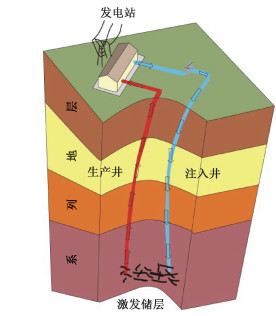
 下载:
下载:
